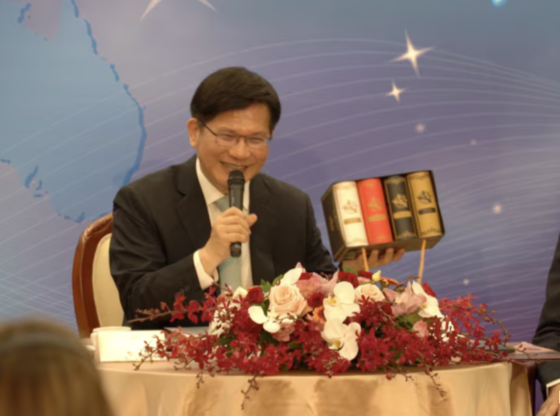TAIPEI- In response to former US President Donald Trump’s recent statement that Taiwan should pay protection fees, Taiwan’s Foreign Minister Lin Chia-lung said on Friday (July 19) that Taiwan’s defense budget has almost doubled in the past eight years and continues to increase, and “it has paid the military expenses it should pay.” He said that no matter who enters the White House in the future, the Chinese threat is a consensus between Trump and current President Joe Biden, and it is also a global consensus.
According to a report by Bloomberg Businessweek on July 16, when Trump was asked in an interview “Will you defend Taiwan against Chinese attacks?”, he said, “Taiwan should pay us (the United States) for defense.” He also complained that the United States, like an insurance company, needs to collect premiums, but “Taiwan has given us nothing.”
Trump mentioned Taiwan again at the Republican National Convention held in Milwaukee, Wisconsin, on July 18. He said: “Taiwan and the entire Asia are shrouded in an increasingly deep haze of conflict, and the earth is on the brink of World War III.” Trump’s
statement that Taiwan should “pay protection fees” has sparked heated discussions in Taiwan in recent days.
Some analysts have argued that since Taiwan is helping the United States defend the first island chain, it is the United States that should pay Taiwan. However, other observers say that if the United States can clearly mark the price of the protection fee, Taiwan may be willing to pay.
Former US President Trump officially accepted the Republican presidential nomination on July 18. Trump mentioned China several times in his acceptance speech and once again called the new coronavirus the “Chinese virus.” He also said that Hungarian Prime Minister Orban recently told the media that the solution to the current global war problem is to let Trump return to power because “Russia is afraid of him, China is afraid of him, and everyone is afraid of him.” …
Lin Chia-lung: China threat is a consensus between Trump and Biden
In response to this, Lin Chia-lung held his first international press conference after taking office on Friday and had tea with foreign media reporters stationed in Taiwan. When asked if he was worried about Trump’s remarks on Taiwan, Lin Chia-lung said that Trump’s statement focused on the threat posed by China, which is a consensus shared by the two US presidents Biden and Trump, and is also a global consensus.
He said, how should Taiwan respond to the Chinese threat? What role should it play? The Taiwan government attaches great importance to opinions from all walks of life. In terms of national defense and military construction, Taiwan has long demonstrated its determination to defend itself through military purchases from the United States. In particular, Taiwan’s defense budget has nearly doubled in the past eight years, which is also a demonstration that Taiwan does not rely on others or take chances.
Lin Chia-lung said at a press conference: “During the eight years of (former) President Tsai Ing-wen’s term, the defense budget in 2016 was NT$349.7 billion, and it will increase to NT$606.8 billion in 2024. This number has almost doubled, so this number can show that Taiwan is paying the military expenses we should pay.”
Taiwan’s defense budget this year accounts for 2.5% of its gross domestic product (GDP), a record high. However, Robert O’Brien, who served as the White House national security adviser in the Trump administration, also said on Wednesday (July 17) that in the face of the possibility of Chinese aggression, Taiwan needs to significantly increase its defense spending. He suggested that Taiwan should further increase the proportion of its defense budget to GDP to at least 5%, which is equivalent to doubling its spending to keep up with China’s military expansion.
In response to former US President Donald Trump’s recent statement that Taiwan should pay a higher protection fee, Taiwan’s Foreign Minister Lin Chia-lung said on Friday (July 19) that Taiwan’s defense budget has almost doubled in the past eight years and continues to increase, and “it has paid the military expenses it should pay.” He said that no matter who enters the White House in the future, the Chinese threat is already a concern for Trump and current President Joe Biden (Joe Biden)
Lin Chia-lung: Taiwan’s defense spending is rising Experts: It is difficult to reach 3% of GDP.
In this regard, Lin Chia-lung said that Taiwan’s defense budget has risen from less than 2% of GDP in the past to 2.5% of GDP, and will continue to increase in the future. He emphasized that as China’s military spending continues to rise, not only should Taiwan, which is on the front line of China’s threat, increase its military spending, but other countries should also make corresponding efforts.
However, Taiwan’s military experts do not believe that there is much room for Taiwan’s military budget to increase.
Jie Zhong, an associate researcher at the National Policy Foundation in Taipei, said that Taiwan’s annual GDP growth rate is higher than the growth of the government budget scale. Therefore, under the premise of unchanged tax system, it is already difficult for the defense budget to account for 3% of GDP. In particular, although this year’s military expenditure has reached a record high of 2.5% of GDP, it is also the result of two special budgets totaling NT$94.3 billion.
Jie Zhong analyzed that between 2008 and 2024, the annual expenditure amount compiled by the Taiwan government’s total budget only grew by 169%, lagging behind the GDP growth rate of 211% in the same period. He said that although Taiwan’s social wealth has increased year by year, it has not been reflected in government tax revenue at the same time, and the government’s budget has also expanded slowly.
Jie Zhong told VOA: “The defense budget will continue to increase, but I think it will be difficult to reach 3% of GDP unless the government increases taxes.”
Lin Jialong: Xi Jinping’s timetable for military reunification is a cognitive warfare trick
Compared to the scale of Taiwan’s defense budget, China’s military expenditure has increased year by year for 20 years. This year’s military expenditure has reached 1.67 trillion yuan, an annual increase of 7.2%. In addition, the CCP has never given up the military reunification plan for resolving the Taiwan issue. Therefore, people from all walks of life have speculated that Chinese President Xi Jinping has set a timetable for military invasion of Taiwan.
In response to this, Lin Jialong also responded at the press conference that China is good at releasing the wind vane of the timetable to restrain its opponents, but it is actually a cognitive warfare trick. The key lies in how to achieve the target. He said that 2021 is the 100th anniversary of the founding of the Communist Party of China, 2027 is the 100th anniversary of the founding of the People’s Liberation Army, and 2049 is the 100th anniversary of the founding of the People’s Republic of China. These time points have been reported as the timetable for the CCP to reunify Taiwan by force, but Taiwan must be careful not to fall into the trap of being restrained.
Lin Jialong emphasized that what Taiwan can do is to prepare for war with all its strength so that Xi Jinping dare not launch a military reunification.
Lin Chia-lung said at the press conference: “I think time is on the side of the more prepared and more united. We must be prepared for all possible responses to the CCP’s invasion of Taiwan, but we must be very united. This unity includes the unity of our country and the unity of countries with similar international ideas.”
He also said that during the eight-year term of former Taiwanese President Tsai Ing-wen, she established long-term cooperative relations with the former Trump administration and the current Biden administration of the United States. In the next four years, no matter who wins the presidential election and enters the White House, the bilateral exchanges will help deepen the future cooperation between Taiwan and the United States.
Lin Chia-lung said: “In the future, no matter which party is in power in the United States, (Taiwan and the United States) have good experience in cooperation. Of course, each president has his own leadership style, and we must find the best way to get along.”
Lin Chia-lung emphasized that the Taiwan-US relationship is based on the Taiwan Relations Act and the “Six Assurances”, and is also based on the bipartisan support for Taiwan in the US Congress and the continuity of the US executive branch’s Taiwan policy.

